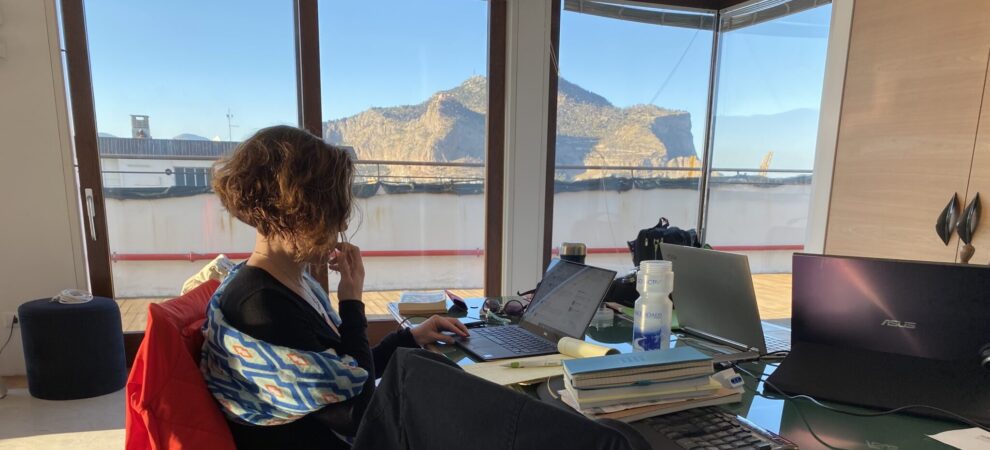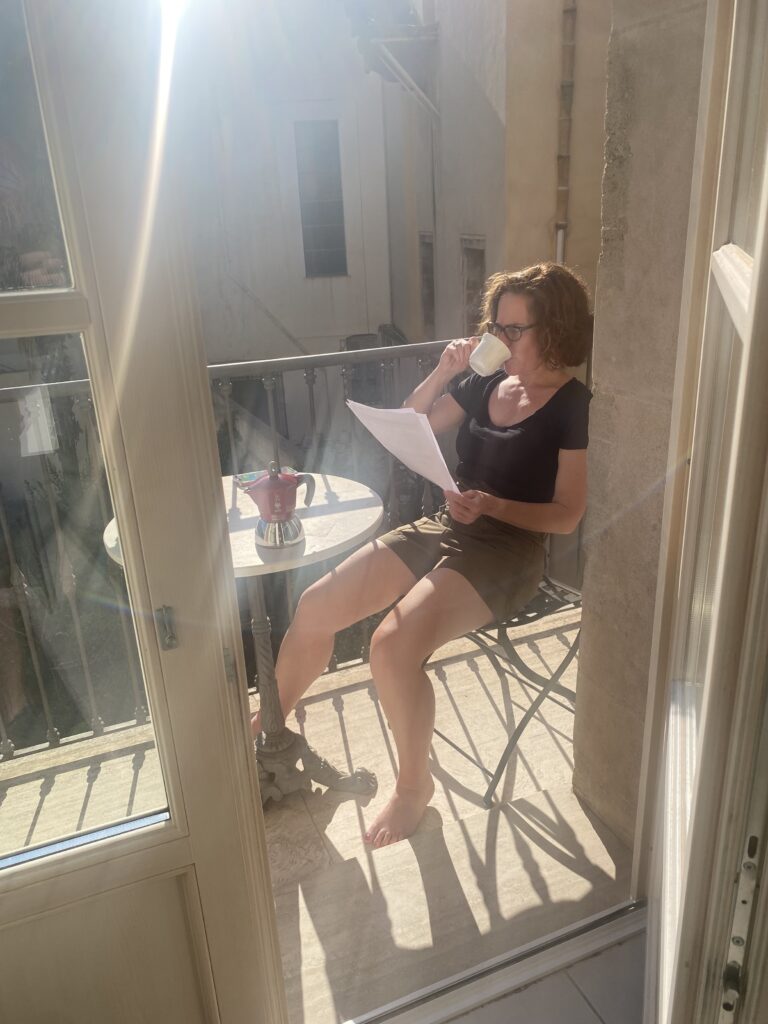
Principles: Make time for yourself, Build the world you want to live in
I visited Italy for the first time when I was 14. I was very fortunate that my parents, after many years vacationing exclusively at the Jersey Shore, had finally saved up enough money to travel internationally. As the much younger of three kids—the “oops baby” you might say—they decided to take me with them. The trip was a budget whirlwind involving a large group of first-time travelers and harried tour guides shuttling us to many cities over the span of two weeks.
By the end of our adventure, all I could think was, “I am coming back here.” And I have, again and again. First, it was for studies and then rounds of reunions and backpack-style vacations. Then I fell in love with someone as Italy obsessed as I am, and we started plotting longer stays. Slowly, we hatched a plan to take ourselves, our laptops, and our two separate businesses to the southern island of Sicily for weeks and months at a time.
“Operation Portmani in Sicily” (“Portmani” is the portmanteau of our two last names, Portella and Firmani.) started with a four-week test in Catania, Sicily’s second-largest city, in 2017. This was pre-COVID when all of Minerva resided in a one-room office in downtown Seattle. Remote work seemed scary, and I had considerable founder’s syndrome-induced anxiety that the business would fall apart without me. To my surprise and delight, everything was fine.
This kind of remote work is not for everyone. Many people don’t have the financial resources to do it, or they’re caring for young kids or aging parents, or they simply don’t have the travel bug. But if you can make it work and you have the urge, working in a far-flung location can be amazing. Over the years (with a two-year hiatus for COVID), the Portmanis have been tweaking systems, processes, and plans to make this annual experience even smoother. In our post-COVID world of increasing remote work acceptance, I have wisdom to share with first-time “very remote work” explorers.
Use time zones to your advantage. Sicily has a nine-hour time difference with Seattle. That’s significant but I’ve learned to use that time difference to our team’s advantage. I have been able to reorient my workday to 2:00-9:00 pm local time in Sicily—what my husband calls “working the second shift.” That allows me to have a few hours of overlap with my colleagues on the U.S. West Coast and even more overlap with colleagues in other U.S. or global time zones. I schedule my necessary meetings into these precious hours of overlap.
Then while I’m eating a late dinner and sleeping, my colleagues send things for me to review, edit, and think about when I get up in the morning. The result is a productive workflow in a time zone that puts me temporally ahead of my team and many of our clients. As someone who constantly feels behind in Pacific Standard Time, the ability to wake up ahead of the game fills me with a sense of ease. Taking a morning cappuccino stroll or popping into shops or a museum makes it even better.

Get yourself a good set-up. I need two things to function well at work: good sleep and good wifi. I achieve good sleep by having a comfortable, predictable place to rest my head every night. To this end, we rent a nice apartment for the duration of our stay in Sicily. For the last couple of years, we have gone to the capital city of Palermo, and we’ve stayed in the same place where we know the landlord and the local commerce and transportation. We travel on the weekends, but our work weeks are spent in a well-appointed workspace that I know how to navigate with my co-working husband. The mattress is also super comfortable (see point above re: sleep).
Similarly, the wifi is reliable. In an age when we feel connected everywhere, all the time, that may not seem like a big deal. But it is one thing to have bandwidth to receive a couple of texts; it is another to do 5+ hours of zoom calls. You need a serious wifi connection. Living in a remote village or hopping into an internet café may sound fun and adventurous but it gets old when you’re trying to run a business day in and day out. Maximize your chances of success by minimizing your chances of internet outages.
Communicate, communicate, and communicate some more. In the past three years of the COVID-19 pandemic, Minerva has become a fully remote company with team members in five states. That has forced us to become more intentional about sharing information, and particularly, clarifying when we are and are not working. All of this is even more important when I’m in my “very remote” work situation in Sicily.
Because Minerva is a Microsoft Teams operation, I have a standing set of notes in Teams about my Italian working hours. I’m clearly marked on our shared PTO calendar which days I’ll be out having adventures (because it can’t be all work and no play) and I mark my Outlook calendar with my specific work hours and when I’m able to do meetings. I also try to chat the team when I’m signing on or off for the day, though I need to be more consistent with this. In addition, I am clear with clients that I am working in Europe to set expectations about when they can contact me or one of my colleagues. I have only heard positive, sometimes slightly envious, feedback from our clients about this arrangement.
Practice real-life ambition. One of Minerva’ principles is to be bold and ambitious while realizing that capacity constraints are real. I meditate on this principle often, and particularly when I’m working in Sicily. It’s tempting to go to all the museums, take all the trips, and hear all the concerts. But if you’re working full time, you’ve got to adjust your expectations and pace yourself.
During one Sicilian adventure, I tried to take four hours of intensive language classes each day before starting my workday. My Italian improved, but it was like working two jobs and I wasn’t having fun. I modified my expectations to review Italian grammar and vocabulary 15-20 minutes per day and then spend more time talking to people and soaking up the language through interactions. My language skills are solid, and I feel much less stress. Similarly, in your workday, you will not be able to do it all. You’ll have to miss meetings and in-person client opportunities. You’ll need to delegate more and ask your colleagues to take on things without you. That may seem scary, but it makes work manageable, and your colleagues might appreciate it (see the next point).
Take your team’s temperature. This note is specifically for managers. You’ll want to check in with each team member a few weeks in advance of your departure to see if they’re feeling any concerns or have questions about how things will work while you’re in a distant time zone. It is helpful to keep an open line of communication during your very remote work, and to check in with the team when you get back. I have been so pleased to hear that my team feels supported and fulfilled when I’m gone. Some team members liked taking on additional responsibilities and others felt like I never went anywhere. But it is critical to check in with the team to make sure they’re feeling positive—or to address any negative vibes before they become substantive challenges.
Minerva’s most resonant principle for me is to “build the world you want to live in.” On one hand, that means fighting for justice and equity to make this deeply troubled world a better place. But it also means building a life for yourself—and supporting others as they construct their own lives—that is as happy and fulfilling as possible.
I am thrilled at the exploration that has allowed me to live and work in a place that has felt like a second home since I set foot there as a teenager. I hope that other Minerva team members can undertake similar explorations around travel, family, or whatever helps them show up as their best and most authentic selves. I am ready and willing to be their enthusiastic collaborator.